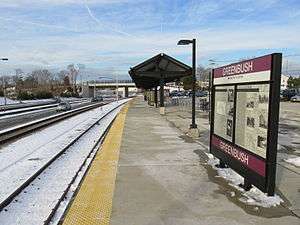Greenbush (MBTA station)
GREENBUSH | |||||||||||
|---|---|---|---|---|---|---|---|---|---|---|---|
 Platform at Greenbush, looking inbound | |||||||||||
| Location |
247 Old Driftway (Driftway & Stockbridge Rd) Scituate, Massachusetts | ||||||||||
| Coordinates | 42°10′46.2″N 70°44′45.6″W / 42.179500°N 70.746000°WCoordinates: 42°10′46.2″N 70°44′45.6″W / 42.179500°N 70.746000°W | ||||||||||
| Line(s) | |||||||||||
| Platforms | 1 side platform | ||||||||||
| Tracks | 1 platform track; 4 yard tracks | ||||||||||
| Construction | |||||||||||
| Parking |
1000 spaces ($4.00 fee) 22 accessible spaces | ||||||||||
| Disabled access | Yes | ||||||||||
| Other information | |||||||||||
| Fare zone | 6 | ||||||||||
| History | |||||||||||
| Opened | October 31, 2007 | ||||||||||
| Closed | 1959 | ||||||||||
| Traffic | |||||||||||
| Passengers (2009 daily) | 575[1] | ||||||||||
| Services | |||||||||||
| |||||||||||
Greenbush is a passenger rail station serving as the terminus of the MBTA Commuter Rail Greenbush Line. It is located at 247 Old Driftway in the Greenbush section of Scituate, Massachusetts. Greenbush is 27.6 miles (44.4 km) from South Station and a one-way trip takes about 59 minutes.[1]
Like the other stations on the line, Greenbush has a single high full-length side platform serving a single passenger track. The other four tracks at the station area are used as the layover facility for the line. There are two large parking lots cut into two by Old Driftway. The parking lots total 1000 spaces - twice the capacity of the other stations on the line - to accommodate commuters driving in from Hanover, Norwell, Marshfield, and Duxbury. With 575 boardings on an average weekday, Greenbush is the busiest station on the line.[1]
History
The modern Greenbush Line was originally built as the South Shore Railroad, which opened to Cohasset in 1849. The Old Colony-backed Duxbury and Cohasset Railroad, chartered in 1867, which opened from Cohasset to Duxbury in 1871, including a stop at Greenbush.[2][3] After financial troubles in the 1870s, the Duxbury and Cohasset was joined with the South Shore under the fold of the Old Colony Railroad in 1877. The Old Colony was leased to the New York, New Haven, and Hartford Railroad in 1893.

Greenbush became an important short-turn terminal on the South Shore Line, particularly as ridership began to wane. Service south of Greenbush, limited to a single South Duxbury round trip since 1932, was discontinued in 1939 after the 1938 New England hurricane damaged the causeway over the North River to Marshfield.[3] The line enjoyed a brief uptick in traffic in World War II with the construction of the Hingham Naval Ammunition Depot and the Hingham Naval Ammunition Depot Annex. The number of daily trips was increased from 4 to 8 after World War II under Frederick C. Dumaine, Jr., and modern diesel trains including Budd RDCs were introduced in the 1950s. However, the New Haven Railroad continued to lose money on the service, and after Dumaine was ousted the railroad announced all trains would cease running in 1958. Only an emergency subsidy by the state kept trains running until June 30, 1959 when the Southeast Expressway opened and all passenger train service ended.[3]
Calls for the former Old Colony lines to be reactivated began in the 1980s; the Plymouth/Kingston Line and Middleborough/Lakeville Line were reopened in 1997. After much controversy surrounding the $534 million project, construction was completed in 2007. The Greenbush line and Greenbush Station were opened for full service on October 31, 2007 after a ceremonial train the previous day.[4]
References
- 1 2 3 "Ridership and Service Statistics" (PDF). Massachusetts Bay Transportation Authority. 2010. Retrieved 3 January 2013.
- ↑ Karr, Ronald Dale (1995). The Rail Lines of Southern New England. Branch Line Press. pp. 316–317. ISBN 0942147022.
- 1 2 3 Thomas J. Humphrey. "History of the Greenbush Rail Line". WATD-FM. Archived from the original on 2007-09-28. Retrieved 2007-11-06.
- ↑ Belcher, Jonathan (12 November 2012). "Changes to Transit Service in the MBTA district" (PDF). NETransit. Retrieved 3 January 2013.